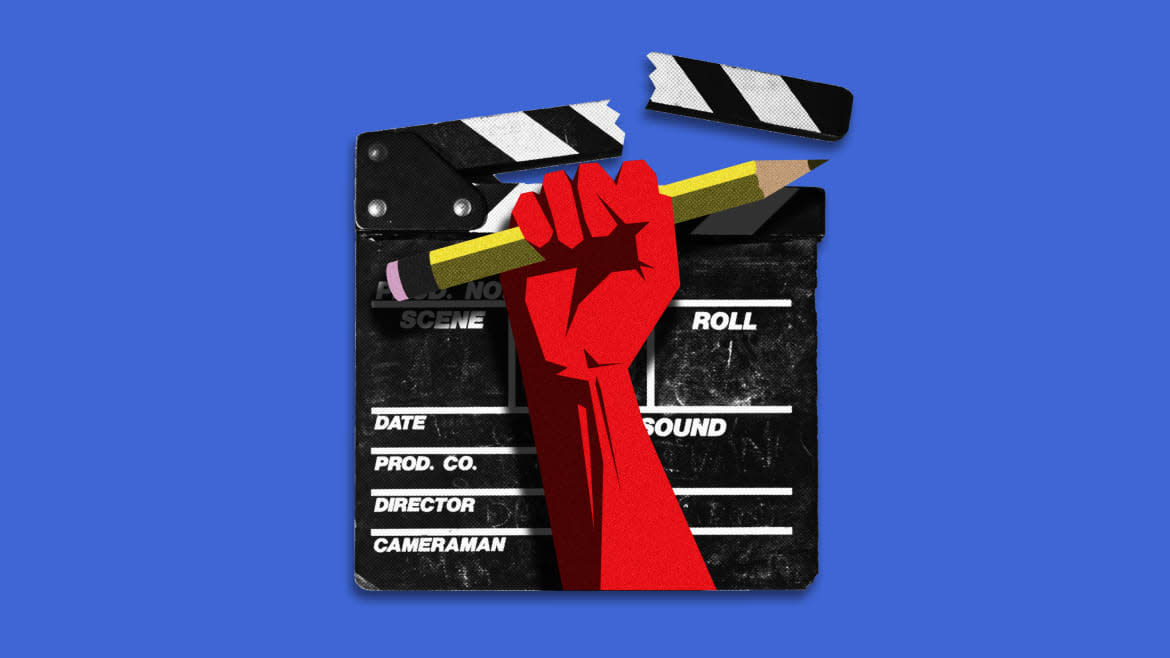It’s Official: Hollywood Writers Strike for First Time in 15 Years

The moment Hollywood’s biggest studios have been dreading (while not doing anything about it) is finally here—again. After failing to reach a new contract agreement that would improve pay for thousands of TV and film writers negatively impacted by streaming, the Writers Guild of America is set to go on strike.
The WGA’s previous contract expired at 11:59 p.m. ET on Tuesday, which means the union could formally announce a walkout at any time. This watershed event comes just a day after International Workers’ Day and a few hours after Hollywood elite gathered for the bougiest event of the year.
“Here is what all writers know: the companies have broken this business,” the WGA wrote in a memo to members announcing the strike late Monday night. “They have taken so much from the very people, the writers, who have made them wealthy. But what they cannot take from us is each other, our solidarity, our mutual commitment to save ourselves and this profession that we love. We had hoped to do this through reasonable conversation. Now we will do it through struggle. For the sake of our present and our future, we have been given no other choice.”
Despite the massive impact a strike will have on the year’s television output—and possibly some movie releases—this announcement is not particularly shocking. Writers, networks and studios have been anticipating a potential walkout since February if they couldn’t reach a fair deal with the Alliance of Motion Picture and Television Producers. (AMPTP represents studios, production companies and streaming services.) And in March, the WGA released a report titled “Writers Are Not Keeping Up,” outlining the ways writers’ salaries have decreased in the wake of streaming.
“On TV staffs, more writers are working at minimum regardless of experience, often for fewer weeks, or in mini-rooms, while showrunners are left without a writing staff to complete the season,” the report stated. “And while series budgets have soared over the past decade, median writer-producer pay has fallen.”
Among other gripes, union members point to the increasing percentage of showrunners and staff writers working for the Minimum Basic Agreement, bargained by the Guild. Their list of demands also include higher residuals and an address of television’s current “mini-room” problem. (Mini-rooms are smaller versions of writers’ rooms meant to streamline the greenlighting process. Predictably, they pay less.)
The union also requested regulations on the use of artificial intelligence, regarding AI-generated scripts or reworked material that threatens to put human writers out of work as it swiftly becomes more prevalent in the industry.
Why You Should Care That Hollywood Writers Are Poised to Strike
On April 17, union members voted overwhelmingly to authorize a strike, if need be. Now that we know the result, what will the entertainment landscape look like in the coming months without its most essential workers?
Well, we can look to history, given that Hollywood writers have previously gone on strike six times—although the television landscape has undergone dramatic changes since the last WGA strike in 2007.
Naturally, many of your favorite television shows will cease production. Thousands of actors, directors and crew members will be out of work, with below-the-line workers suffering the worst of the economic fallout. Scripted shows that are currently airing will most likely wrap up their seasons. However, this work stoppage could affect TV’s fall schedule. It could also delay films with release dates, though studios have apparently been stockpiling scripts.
Late-night shows, on the other hand, will feel the effects of the strike immediately. In a memo obtained by the Los Angeles Times, the WGA said the strike would instantly pause “new episodes of late-night shows including Jimmy Kimmel Live!, The Tonight Show Starring Jimmy Fallon, Real Time With Bill Maher, Late Night With Seth Meyers, Saturday Night Live, Last Week Tonight With John Oliver, and others.” The Guild posited there will also be a “knock-on effect” on streamers that rely on new episodes of broadcast TV shows.
Depending on how long it takes AMPTP to negotiate a fair agreement, this strike could cost the Hollywood industry, which has already seen major cost-cutting and consolidation efforts in recent years, billions of dollars. The previous recent strike, from November 5, 2007 to February 12, 2008, lasted 100 days and caused approximately $2 billion ($3 billion today) in economic damage.
For now, the world will watch as writers across the country presumably partake in mass demonstrations. The strike comes at a particularly apt time for addressing Hollywood power brokers: TV’s upfront season. Likewise, WGA East has its eyes on several picket sites, including the NBCUniversal upfront at Radio City Music Hall on May 15, Netflix’s event at Manhattan’s Paris Theater on May 17 and Warner Bros. Discovery’s gathering at The Theater at Madison Square Garden on May 17.
These Emmy-Winning Writers Are ‘Broke’ and Voting to Strike
Get the Daily Beast's biggest scoops and scandals delivered right to your inbox. Sign up now.
Stay informed and gain unlimited access to the Daily Beast's unmatched reporting. Subscribe now.


